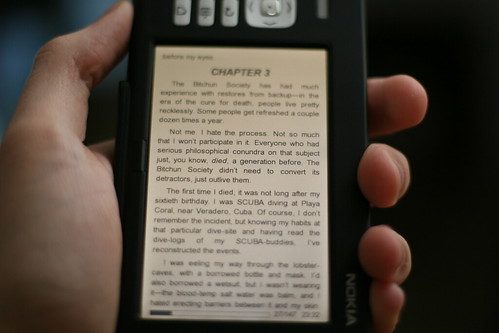On Saturday, I participated in Orlando’s Barcamp, dev-day. I spoke early in
the day, and I knew from listening to others who talked about the previous
Barcamp that my topic would be unusual. Here’s the gist of my talk:
The title is from the philosopher Hippocrates, who lived in Greece, around
400BCE. He was observing that life is brief compared to what we can make and
do. How do we know Hippocrates said these words? We have records from that
time.
400BCE is relatively young, as “ancient civilizations” go. I gave examples of
other civilizations, spanning back to the oldest, of Sumer, 8000 years ago. We
know a lot of the Sumerians, and we know a lot of most every literate ancient
civilization, but not a lot about one specific civilization. The Egyptian
empire lasted from 3100BCE to 50BCE, and though we know a lot about the
civilizations before it and the ones after it — we know very little of Egypt.
All because of something the Egyptians invented: Paper.
Egyptians put their art on stone, which lasts even until now. They wrote their
information on their new technology, which didn’t last more than a generation
or so. The civilization that made the African pyramids are much more of a
mystery to us than they should be. That’s the cautionary tale, and we should
worry about how we are in the same danger.
What will the people of a thousand years from now know of us? Will we be the
group that consumed a huge fraction of resources, poisoned the environment, and
left behind only a mystery about who, how, why? How long will information
about you and me last? 10,000 years? 1000? 100? Even 50? Does that 50
sound preposterous?
Consider: We, in the 21st century are in a much worse predicament than the
Egyptians were. We store a large portion of our data on something that is so
ephemeral that we’re usually startled to find a device still operational after
10 years. In 2002, we created 5 exabytes of new information. For too much of
it, we have no real control over how it’s stored, either because it’s too
massive or often because it’s beyond our reach.
Contrast what a budding biographer of now and 80 years in the future would do
to publish her grandfather’s letters from war? A child of today would dig up
dusty letters out of an attic, but the child of the future will have to ask
Yahoo for copies of archived e-mail. Can you imagine what they’re likely to
say? “404!”

So, what can we do?
I propose and dismiss “Hope for the Singularity to save it.” Also, “stop
making so much.”
Two ideas that may have merit are: Label our data with how unique and
important it is likely to be. Make our own version of stone tablets.
Neither of these are particularly hard problems. All we have to do is put a
little effort into it, and we’d have a solution to 90% of the problem. This the fun part, and I’ll leave most of it for you, dear reader to think about.
Here are a few of my ideas: 3-D printing of information bricks. Quaternary bits of DNA, in some durable container. Knots are an encoding of a series of hand movements.
06 Apr 2008, 21:37 #



